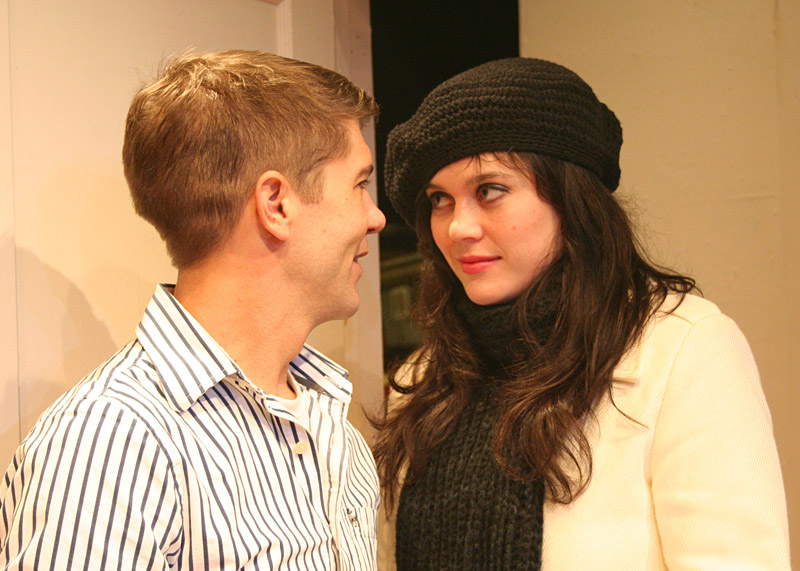In Adam Rapp’s quick-witted and disturbing drama about intimacy, friends Matt (Richard Nguyen Sloniker) and Davis (Tim Gouran) are visiting Amsterdam. Both are hyper-articulate Brown graduates, but there the resemblance ends. Davis, hot from having recently discovered a best-selling manuscript in his publishing house’s slush pile, smashes through doors Jackie Chan–style, seizing life by the balls and taking no prisoners. Matt, a starving playwright fighting depression and various other maladies, moves more slowly—barely deigning to stay alive. Whether out of pity, contrition for a past wrong, or as a sadistic experiment, Davis gifts Matt a beautiful prostitute named Christina (Mariel Neto) after first sampling her “wares” himself. Matt and Christina’s encounter—tender, seemingly vulnerable, at once personal and not—holds very different meanings for all three, which the excellent cast bravely conveys.
Courageous acting doesn’t just mean taking off clothes, which several of Red Light‘s performers do, but also removing one’s social varnish to become truly translucent. All three principals deserve praise for enacting some physically and emotionally rough scenes, but they remain just as focused during Rapp’s more distended and almost banal passages. (The play debuted at Steppenwolf five years ago; Rapp also writes screenplays and young-adult novels.) These three characters have distinct thought patterns and agendas, but director Desdemona Chiang allows them to remain somewhat mysterious, just as we’re left guessing about our friends in real life.
Thus, when Christina shows up at Matt’s cluttered East Village apartment to begin the second act, she’s even more of a cipher than she was in Amsterdam. She allows him to project his narcissistic interpretation of their connection onto her blank—and by then quite blighted—canvas. With lesser actors, this predictable artist/muse obsession scenario could be insufferable, yet Red Light instead yields a mood of suspense and a wealth of succulent ambiguities to mull over afterward.
What draws us into relationships with friends and/or lovers? How much of the intimacy we perceive is real? How and why do hurtful people compel fascination? Rapp’s script spins off many such questions. However, it also generates numerous zones of implausibility—the most problematic being why Matt remains friends with the flagrantly evil Davis, who unflinchingly invades Matt’s computer, pollutes his home, and worse.
But it’s the acting more than the text that makes this a strong debut for the new company Azeotrope. When Matt hears a knock on his door in New York, his eyeballs dart around the room for what seems like an eternity. It’s as if he’s watching the private movie of his hopes and expectations. Then the door opens to reveal a love object who’ll remain maddeningly external and inconveniently autonomous. Even when naked, these three are opaque to one another.








